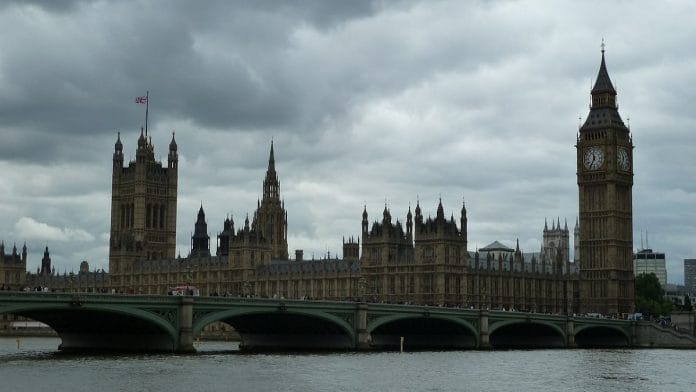New Delhi: The UK government has “no strategy” to tackle China’s growing threat to its national security, and its present approach has been “completely inadequate” with too much focus on short-term economics rather than long-term risks, claimed a British parliamentary committee report released Thursday.
Terming China’s ambition of becoming a technological superpower the “greatest risk” to the country, the Intelligence and Security Committee (ISC) of the British Parliament in its report alleged China uses widespread resources and intelligentsia — “almost certainly the largest in the world” — to “target the UK and its interests prolifically and aggressively”.
The ISC consists of nine members drawn from both Houses of the British Parliament and is appointed by Parliament.
The roughly 200-page report also criticised the UK government for “failing to think long-term and dominating their focus on short-term threats”. The government has ignored “risks to national security, and the threat to future prosperity and independence in favour of current investment”, the report alleged.
It warned that UK was on a “trajectory for the nightmare scenario” where China will soon be exerting its influence “at every step”.
“China has penetrated into all sectors of the British economy, from technology to energy and appears to be winning the battle for technological supremacy with the West,” claimed the report.
Also Read: India facing ‘increasingly aggressive’ China, US should help deter & respond: US think tank
China’s ‘aggressive’ interference
Discussing China’s “whole-of-state” approach, the report highlighted the UK’s lack of effective measures to deal with China’s use of both state-owned and non-state-owned companies, academic, cultural institutions as well as citizens to interfere in domestic operations across the globe.
“China is similarly aggressive in its interference activities: while seeking to exert influence is legitimate, China oversteps the boundary. It has been particularly effective at using its money and influence to penetrate or buy academia to ensure its international narrative is advanced and criticism suppressed,” the report alleged.
The ISC report examined China’s influence on the UK’s academia and research, through “directing, funding and collaborating” to further spread and control the narrative of global debate, and squash criticism.
According to the report, the government has “shown very little interest in warnings from academia”, about China’s leveraging of fees and funding and influence over the UK academics “through inducements and intimidation.” “Some academic institutions seem to be turning a blind eye to such efforts, happy simply to take the money,” the report claimed.
It added: “China is attempting to gain economic dominance over the UK, take advantage of collaborative projects to steal information as well as benefit the Chinese military through research on dual-use techniques.”
Dual-use technology are tools developed originally for military use, which are also commercially viable for civilian or industrial use. Some examples include satellites, missiles, and nuclear technology, among others.
The committee also explored China’s approach to dealing with the Covid-19 pandemic to allegedly further its agenda across the global order.
“China’s attempts to influence the international narrative can also be seen clearly in its response to the pandemic, sowing seeds of doubt about the origins of the virus and greatly exaggerating its work to counter it,” the committee alleged.
The report also focused on China’s use of the UK as a centre of investment, especially in nuclear energy projects, namely the China General Nuclear Power Group’s involvement in the UK Civil Nuclear sector.
“We have serious concerns about the incentive and opportunity for espionage that Chinese involvement in the UK’s Civil Nuclear sector provides. While we recognise that the threat of disruption is less likely, the threat of leverage is very real”, the report added.
(Edited by Richa Mishra)
Also Read: Driven by people-to-people ties, India & US relationship has outgrown China






